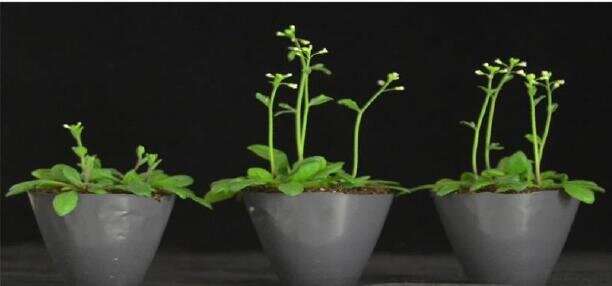How ERF1 regulates flowering

Floral initiation must be strictly regulated to achieve reproductive success. ETHYLENE RESPONSE FACTOR1 (ERF1) functions as an important integrator of several phytohormone signals to regulate both development and stress responses. However, the underlying mechanism for its role in flowering-time regulation remained unclear.
In a study published in the Journal of Integrative Plant Biology, researchers from the Xishuangbanna Tropical Botanical Garden of the Chinese Academy of Sciences demonstrated that ERF1 played an important role in floral initiation by directly modulating the expression of Flowering Locus T (FT), a major integrator of inductive flowering pathways.
The researchers first sought to investigate whether ERF1 also participated in flowering-time regulation. By analyzing flowering time in ERF1 knockdown and overexpression lines, they found that regulation of flowering time in Arabidopsis was closely correlated with ERF1 expression. Consistent with expression of ERF1 being induced by 1-aminocyclopropane-1-carboxylic acid, ERF1 contributed to ethylene-induced late flowering. ERF1 participated in flowering-time regulation under both normal and stressed conditions.
To understand how ERF1 mediated flowering-time control, the researchers next compared the expression patterns of diverse flowering-related genes among ERF1 RNAi, wild type and expression of ERF1 (ERF1ox) plants.
They revealed that an ethylene-induced delay in flowering may also be achieved through negative regulation of FT expression by ERF1. The ERF1 acted upstream of FT and negatively regulated floral initiation in a largely FT-dependent manner. ERF1 was also involved in modulation of ethylene-induced late flowering.
"The molecular mechanisms revealed in this study may help us understand the sophisticated flowering-time regulatory networks controlled by ethylene response factors," said CHEN Ligang, correspondence author of the study.
More information: Yanli Chen et al, ERF1 delays flowering through direct inhibition of Flowering Locus T expression in Arabidopsis, Journal of Integrative Plant Biology (2021). DOI: 10.1111/jipb.13144
Provided by Chinese Academy of Sciences



















